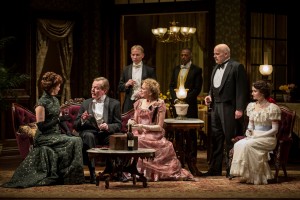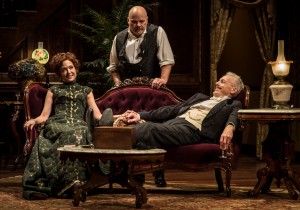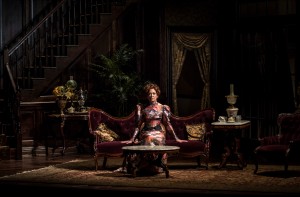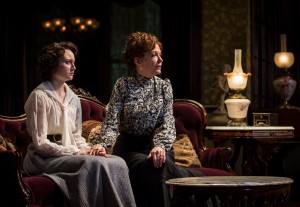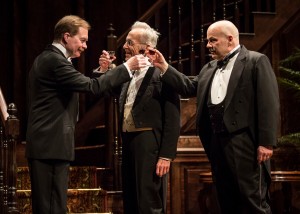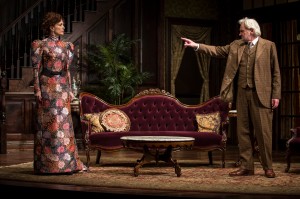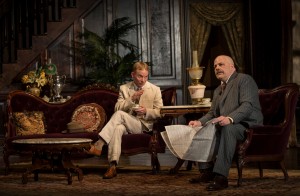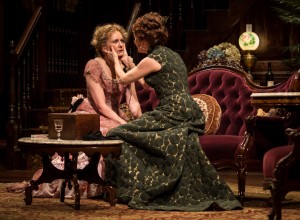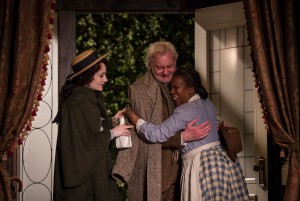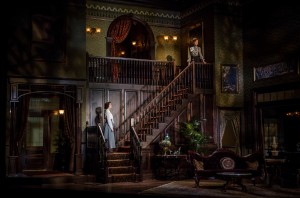DIRTY DOINGS IN DIXIE
In a way The Little Foxes is a complete complement to Margaret Mitchell’s antebellum revisionism in Gone With The Wind (which appeared the same year as Lillian Hellman’s mistresspiece). This nasty work also exposes the true South–greed, not glory–half a century later. Hellman’s brilliantly constructed exposé of a monumentally dysfunctional Southern clan demands relentless realism, if only to counter its penny-dreadful undertow. Set in 1900, Hellman’s 1939 potboiler boasts a juicy plot that hoists the thieving Hubbards on their own petard. Squabbling over a controlling interest in an exploitative cotton gin, these hateful “arrivistes” play a dangerous zero-sum game. Mutual trust and family loyalty, rather than divisive scheming, would make them rich. But, blinded by weaknesses that prove too strong, they declare war–and it’s not civil.
Efficiently but not passionately helmed by Henry Wishcamper, Goodman Theatre’s suitably lavish revival dresses up an ugly plot where the good folks stand out like stars over a cistern. Here wishes turn to curses faster than a fairy tale foments: The audience gets a perverse pleasure–to identify with the sheer energy of the evil characters, then repudiate them by the karma-ridden ending.
In Marvel Comics terms, The Little Foxes is in effect the “origin tale” of today’s 1%. (Hellman did pen a “prequel”–Another Part of the Forest.) Rapacity without regret, grasping without gratification–the Hubbards have it up the wazoo. One third caper/heist story, one third morality play, and one third melodrama, this three-act thriller puts its Biblical title to good use: Hellman’s post-war, nouveau-riche profiteers eagerly ape Southern graciousness and charm (which they’ve married into). But, as foxes were once vilified, they’re plundering pests who despoil each other as much as the land. Right now they’re bent on currying favor from Chicago capitalist William Marshall (Michael Carnavan, plump with privilege), the entrepreneur who will drive their fortune.
Hellman’s fierce focus, however, is on a latter-day Scarlett O’Hara named Regina Giddens. This amalgam of ambition and artifice represents that curious contradiction–a proto-feminist villain. Cruella de Ville with a drawl, Shannon Cochran is a statuesque “vixen” among her foxy clan. Seething against male privilege, Regina plots to, well, outfox her equally fiendish brothers to finance a cotton mill for their crops. With the profits, she intends to light out for civilization in Chicago, cashing the checks and eschewing her kin. That means inducing her invalid husband Horace Giddens (pitiable but noble John Judd) to cough up her share of the investment. The other profiteers are her bad brothers–smoothly satanic Benjamin Hubbard (Larry Yando, silkily sociopathic) and manically malevolent Oscar (Steve Pickering as a bully’s bully and a pit bull on steroids). Stupified by his own skullduggery, Leo (Dan Waller, exuding incompetence), Oscar’s womanizing weasel of a son, works in a bank–morality check enough in this world.
Along with seemingly helpless Horace (repentant for past chicanery), the good souls include tippling, tormented Birdie Hubbard (Mary Beth Fisher, dithering delightfully). Oscar’s abused wife represents the local nobility, Hellman’s nod to endangered Dixie decency: As a “good wife,” she’s a true mother to Regina’s divided daughter Alexandra (Rae Gray, rueful as she wises up to the scoundrels around her). Enshrined in memory, Birdie’s beloved “Lionet” joins the pantheon of literary plantations, along with Tara, Twin Oaks and Belle Reve. Not overly stereotypical, the family servants (Dexter Zollicoffer and Cherene Snow) doggedly remember better times even though we know they weren’t.
After establishing conspicuously consumptive opposites who repel, Hellman sets a crackerjack plot in motion. The twists and turns involve stolen bonds, emotional and financial blackmail, sibling rivalry turned toxic, and a flagrant case of unethical euthanasia, with hints of incest and spousal abuse. (If this all reminds you of August: Osage County, it’s because Tracy Letts mined this play like a hill in West Virginia.)
Spectacularly sumptuous, Todd Rosenthal’s elaborately palatial Victorian drawing room, with its crucial staircase, inspires stunningly taut blocking from Wishcamper and red-meat performances from ten team players. Tackling Regina, a rancid role immortalized by Tallulah Bankhead and Bette Davis, Cochran stirs the plot like a witch’s brew: Her brittle bearing hints at the loneliness that tells us why Regina goes for the gold. Cochran can wax and wane from fashionplate to fishwife in two seconds flat.
Yando is sinisterly suave as equally evil Ben, Pickering splenetically insecure as snarling Oscar, bad seed incarnate. A good person and thus a constant victim, Fisher’s tortured and alcoholic Birdie is pathos personified. As Regina’s disillusioned husband and appalled daughter, Judd and Gray prove that virtue isn’t spineless.
It’s not easy to make Hellman’s contrivances crackle: Here the sparks seem more set than spontaneous. No question, Rosenthal’s ostentatiously ornamental set, Jenny Mannis’ “belle epoque” finery, even Richard Woodbury’s manipulative score combine with a carnivorous cast to honor Hellman’s soap-operatic spitefest. But, almost three hours after its quiet opening, this Little Foxes is not a greater whole than the sum of its scenes. It’s well-made, consummately cast, and perfectly pictorial. But Regina’s crucial comeuppance (in this case a “godownance”) owes more to plot than passion.
photos by Liz Lauren
The Little Foxes
Goodman Theatre’s Albert Theatre, 170 North Dearborn
scheduled to end on June 7, 2015
for tickets, call 312.443.3800 or visit www.GoodmanTheatre.org
for info on more Chicago Theater, visit www.TheatreinChicago.com

